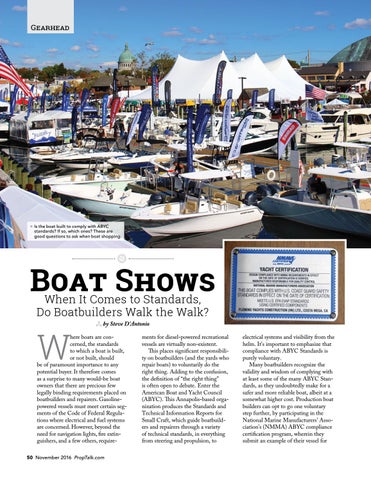Gearhead
##Is the boat built to comply with ABYC standards? If so, which ones? These are good questions to ask when boat shopping.
Boat Shows When It Comes to Standards, Do Boatbuilders Walk the Walk?
W
by Steve D’Antonio
here boats are concerned, the standards to which a boat is built, or not built, should be of paramount importance to any potential buyer. It therefore comes as a surprise to many would-be boat owners that there are precious few legally binding requirements placed on boatbuilders and repairers. Gasolinepowered vessels must meet certain segments of the Code of Federal Regulations where electrical and fuel systems are concerned. However, beyond the need for navigation lights, fire extinguishers, and a few others, require-
50 November 2016 PropTalk.com
ments for diesel-powered recreational vessels are virtually non-existent. This places significant responsibility on boatbuilders (and the yards who repair boats) to voluntarily do the right thing. Adding to the confusion, the definition of “the right thing” is often open to debate. Enter the American Boat and Yacht Council (ABYC). This Annapolis-based organization produces the Standards and Technical Information Reports for Small Craft, which guide boatbuilders and repairers through a variety of technical standards, in everything from steering and propulsion, to
electrical systems and visibility from the helm. It’s important to emphasize that compliance with ABYC Standards is purely voluntary. Many boatbuilders recognize the validity and wisdom of complying with at least some of the many ABYC Standards, as they undoubtedly make for a safer and more reliable boat, albeit at a somewhat higher cost. Production boat builders can opt to go one voluntary step further, by participating in the National Marine Manufacturers’ Association’s (NMMA) ABYC compliance certification program, wherein they submit an example of their vessel for
